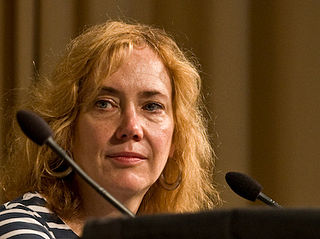A Quote by Porochista Khakpour
I love outsider stories. And I also like a lot of genre fiction, too. So I wanted to write a literary book that flirted with thriller and fantasy and even science fiction. I wanted the coming-of-age story and the love story to be about "outsiderdom" - one of the themes I am most interested in.
Related Quotes
Science fiction is a weird category, because it's the only area of fiction I can think of where the story is not of primary importance. Science fiction tends to be more about the science, or the invention of the fantasy world, or the political allegory. When I left science fiction, I said "They're more interested in planets, and I'm interested in people."
What writers of fantasy, science fiction, and much historical fiction do for a living is different from what writers of so-called literary or other kinds of fiction do. The name of the game in F/SF/HF is creating fictional worlds and then telling particular stories set in those worlds. If you're doing it right, then the reader, coming to the end of the story, will say, "Hey, wait a minute, there are so many other stories that could be told in this universe!" And that's how we get the sprawling, coherent fictional universes that fandom is all about.
'Filk' is the folk music of the science fiction and fantasy community - you get parodies, you get traditional music that's had the words slightly modified, and you'll also get just original works that have been written about science fiction and fantasy works, or with science fiction and fantasy themes.
Science fiction is fantasy about issues of science. Science fiction is a subset of fantasy. Fantasy predated it by several millennia. The '30s to the '50s were the golden age of science fiction - this was because, to a large degree, it was at this point that technology and science had exposed its potential without revealing the limitations.
I often use detective elements in my books. I love detective novels. But I also think science fiction and detective stories are very close and friendly genres, which shows in the books by Isaac Asimov, John Brunner, and Glen Cook. However, whilst even a tiny drop of science fiction may harm a detective story, a little detective element benefits science fiction. Such a strange puzzle.
I love science fiction but I don't like fantastic [cinema]. For example, if you have a magical ring and you can explode the world with it. What are we talking about? You know, it's not interesting. I don't like Lord of the Rings. Even Star Wars, for me, I don't understand this kind of story. But Alien, because the rules of the game are very precise, it could happen. I love science fiction. I have an idea about robots in the future.
A romance novel is more than just a story in which two people fall in love. It's a very specific form of genre fiction. Not every story with a horse and a ranch in it is a Western; not every story with a murder in it is a mystery; and not every book that includes a love story can be classified as a romance novel.
Literary science fiction is a very, very narrow band of the publishing business. I love science fiction in more of a pop-culture sense. And by the way, the line between science fiction and reality has blurred a lot in my life doing deep ocean expeditions and working on actual space projects and so on. So I tend to be more fascinated by the reality of the science-fiction world in which we live.






































